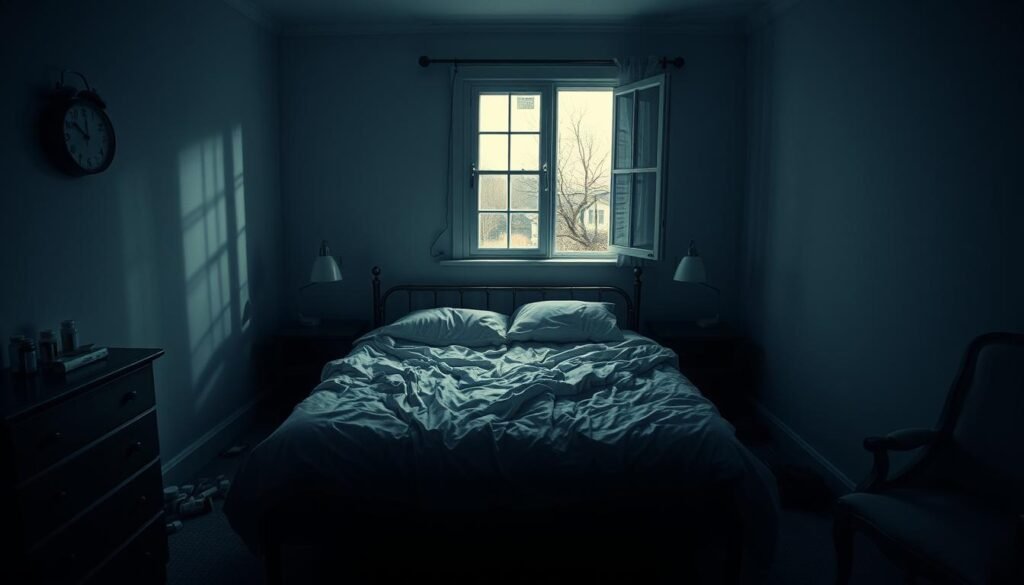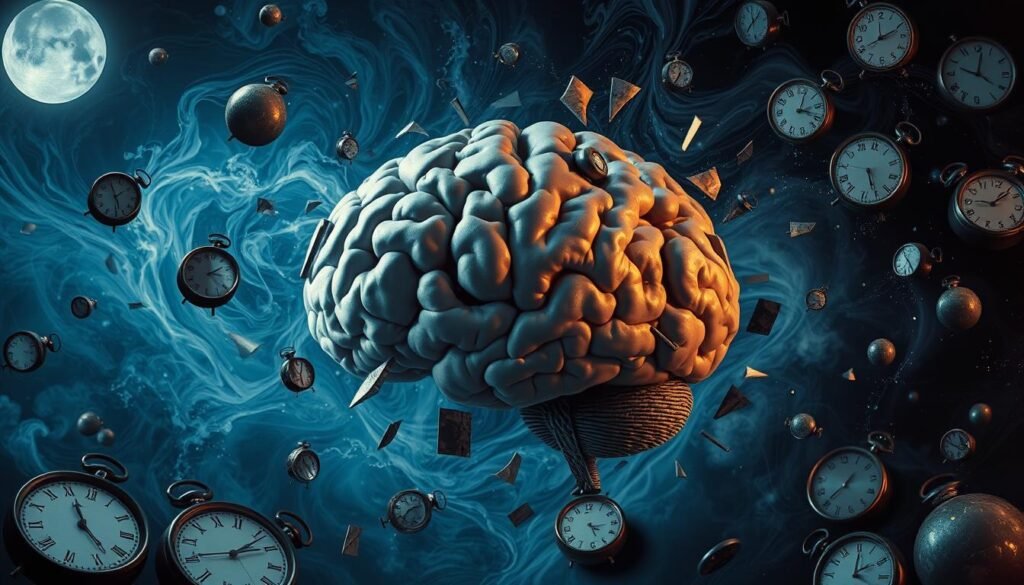Did you know up to 35% of people with dementia have insomnia? This shows sleep issues are a major problem for them. These problems can seriously affect their mental health and overall happiness. The link between dementia and sleep problems involves changes in their sleep cycle. We will look at how insomnia affects dementia. We will also discuss how sleep issues might warn us about declining mental abilities. It’s important to understand these issues to help patients and caregivers have a better life.
Key Takeaways
- Insomnia affects 25% to 33% of dementia patients.
- Sleep problems in dementia can worsen cognitive decline.
- Caregivers may experience additional stress due to sleep disturbances.
- Bright light exposure can improve sleep patterns in dementia patients.
- Melatonin levels decline with age, complicating sleep issues.
Understanding Insomnia
Insomnia creates tough challenges, especially when it’s found in insomnia in dementia patients. People with this disorder have trouble falling asleep, staying asleep, or they wake up too early. And this problem lasts for more than a month. Around 20-35% of those with dementia suffer from these sleep issues. This leads to them having a harder time during the day and a lesser quality of life.
Many things can cause symptoms of insomnia, such as certain medicines, mood disorders, and physical problems. It gets more complex in older adults with various health issues affecting their sleep. It’s crucial to understand these problems to find good ways to treat them.
Studies have shown how serious insomnia can be for mental health. For example, not getting enough sleep can increase the risk of dementia. This highlights why it’s important to keep an eye on how we sleep. Tips include following a regular sleep schedule and adopting behavioral methods to manage sleep troubles.
The link between insomnia and getting worse in cognitive skills needs attention. Looking into how sleep and dementia symptoms are connected may reveal new ways to help. For more details on sleep and dementia, check out this resource.
| Insomnia Symptoms | Impact on Dementia Patients |
|---|---|
| Difficulties falling asleep | May exacerbate cognitive impairments |
| Frequent awakenings | Leads to increased daytime sleepiness |
| Waking up too early | Contributes to diminished quality of life |
| Restless legs syndrome | Can complicate sleep issues further |
| Sleep apnea | Heightens risk of health complications |
Prevalence of Insomnia in Dementia Patients
About 25% of adults with dementia have trouble sleeping. This issue is more common in those with Alzheimer’s disease. In older adults with Alzheimer’s, insomnia rates range from 25% to 50%.
In long-term care, up to 80% of dementia patients might have obstructive sleep apnea. These sleep issues can make agitation and behavior problems worse. Also, 60% of those with mild dementia or cognitive problems report sleep troubles.
Insomnia doesn’t just impact patients; it affects caregivers too. Tackling sleep problems is vital for improving life quality for both dementia sufferers and their caregivers. Better sleep can lead to improved care and support for everyone involved.

Signs of Dementia Related to Sleep Problems
It’s important to understand the signs of dementia related to sleep issues. Sleep problems can be early signs of thinking problems. People may wake up often at night, have trouble falling asleep, and get very confused in the evening. This is known as “sundowning.” These signs are not just about bad sleep. They also point to deeper problems related to thinking and sleep.
Changes in the body’s sleep cycle affect how well we sleep. Sleep apnea is common in people with dementia and can make thinking problems worse. Studies show that having trouble sleeping can increase the chance of dementia later. This risk is especially high if sleep problems start before 40.
Too little or too much sleep can hurt how we think. Both can lead to cognitive decline. Not getting the right amount of sleep is linked to more beta-amyloid and tau proteins. These proteins are closely linked to Alzheimer’s disease.
| Sleep Issue | Impact on Dementia | Associated Risks |
|---|---|---|
| Insomnia | Increases likelihood of dementia diagnosis | Higher risk if present before age 40 |
| Obstructive Sleep Apnea | Leads to hypoxia and disrupted sleep patterns | Increased risk of cognitive decline |
| Circadian Rhythm Disorders | Affects overall brain health and cognitive functions | Can intensify dementia symptoms |
| REM Behavior Disorder | Disrupts sleep continuity | Potential cognitive impairment |
Noticing these sleep-related signs of dementia is key for early help and better care plans. This can lead to a better life for people affected. Caregivers are crucial in spotting these sleep issues. They help make sure that these sleep challenges are dealt with properly.
Does Insomnia Indicate Dementia?
Insomnia is key in understanding the risk of dementia. Studies show a strong link between trouble sleeping and dementia. People with insomnia find it hard to fall and stay asleep, which is tied to getting dementia.
A study of 2,800 older adults found a scary fact. Those who slept less than five hours a night had double the dementia risk compared to those who slept six to eight hours. With over a third of Americans not getting enough sleep, this is a big deal. Especially since 6 million people in the U.S. have Alzheimer’s, the main kind of dementia.
But there’s more to it. Poor sleep might not just predict dementia; it could also show that it’s already starting. People with dementia often struggle with deep sleep. Their sleep issues could be due to their internal clock being off or the dementia itself. Treating these sleep problems can help improve their life and may slow down the loss of cognitive skills.
If you’re caring for someone with these symptoms, it’s crucial to understand the link with dementia. Using good sleep habits and changing some lifestyle parts can really help their mental health. To learn more, check out this resource on sleep issues and.

Is Insomnia a Sign of Dementia?
Insomnia is getting noticed for its possible link to cognitive problems. Studies find a strong tie between sleep troubles and brain health. Not sleeping enough can make cognitive issues worse and up the chance of getting dementia. Research shows that long-term sleep problems could make dementia more likely, especially with insomnia symptoms.
The Connection Between Sleep Disturbances and Cognitive Health
Sleep issues and dementia risk are of big concern to scientists. Bad sleep can harm cognitive health and sleep, leading to trouble with memory and learning. Conditions like insomnia and sleep apnea pose a higher dementia risk for the elderly. They interrupt deep sleep, which is key for brain function.
Research Findings on Insomnia and Dementia Risk
Research suggests that people with insomnia have a 30% greater chance of dementia than those who sleep well. Sleeping less than seven hours links to more Alzheimer’s markers, like beta-amyloid and tau proteins. This data shows a strong link between insomnia and dementia risk. It shows how disrupted sleep can seriously affect brain health over time.
Impact of Insomnia on Dementia Patients
Insomnia greatly impacts those with dementia. It affects their daily life and overall well-being. Sleep problems increase irritability, confusion, and loss of mental function. This makes managing dementia symptoms harder. Older individuals lose about 30 minutes of sleep per decade. This reduction worsens existing dementia issues.
Effects on Daily Functioning and Quality of Life
Dementia patients often struggle with sleep. Falling and staying asleep is hard for them. These sleep issues worsen their cognitive and emotional well-being. The impact of insomnia on dementia leads to serious problems. Patients may get confused and wander at night, harming their quality of life. As dementia progresses, sleep problems get worse. But setting regular sleep schedules can help ease some problems.
How Caregivers are Affected by Sleep Problems
Caregivers are deeply affected by their loved ones’ sleep troubles. Poor sleep increases their stress, fatigue, and burden. Managing nighttime disturbances and day care raises burnout risks. Getting help from medical experts can offer support. It aids caregivers in improving the quality of life and dementia care for their loved ones.

Management Strategies for Insomnia in Dementia Patients
Treating insomnia in dementia patients needs a thorough strategy for better sleep and well-being. Setting up a steady sleep routine is key. This means having fixed times for sleep and wakefulness, which tunes the internal clock. Also, fixing health issues like sleep apnea improves sleep disturbances linked to insomnia.
Cutting down on stimulants before sleep helps a lot. It’s best to limit things like caffeine and nicotine. Using cognitive behavioral therapy for insomnia (CBT-I) is also effective. It has helped many people sleep better.
Bright light therapy (BLT) is another good method for managing sleep problems in dementia. It reduces nighttime wake-ups and increases overall sleep times. Making the sleep area comfy—like using a good mattress, reducing noise, and keeping a cozy temperature—also helps tackle insomnia effectively.
Getting caregivers involved boosts the success of these strategies. They can aid in establishing sleep routines and keeping a calm sleep environment. This teamwork helps those with dementia enjoy better sleep and health.
| Strategy | Description | Potential Benefits |
|---|---|---|
| Consistent Sleep Routine | Establishing fixed sleep/wake times | Regulates internal clock; enhances sleep quality |
| Treat Underlying Issues | Address conditions like sleep apnea | Alleviates specific sleep disturbances |
| Limit Stimulants | Reduce intake of caffeine and nicotine | Promotes relaxation before bedtime |
| Behavioral Interventions | Cognitive Behavioral Therapy for Insomnia (CBT-I) | Provides coping strategies for sleep issues |
| Bright Light Therapy | Exposing patients to bright light at specific times | Improves total sleep time; reduces awakenings |
| Optimize Sleep Environment | Adjust bed comfort, noise, and room temperature | Encourages a restful sleeping atmosphere |
| Caregiver Involvement | Engaging caregivers in implementing strategies | Enhances consistency and adherence to routines |
Connection Between Dementia and Sleep Issues
The link between dementia and sleep issues is complex. Studies show a clear dementia and sleep issues correlation, explaining how brain function changes affect sleep. People with dementia often have a hard time sleeping well. This makes it tough for them to feel rested, leading to problems during the day and emotional stress.
Dementia changes how people sleep in significant ways. An example is how insomnia puts people at risk for Alzheimer’s disease early on. Also, lacking enough sleep can increase harmful proteins in the brain related to Alzheimer’s. This situation worsens cognitive decline, making sleeping even harder.
Recent research suggests sleep problems can affect learning, memory, and concentration. These issues might speed up the start of dementia symptoms. Sleep apnea makes things worse, increasing risks due to low oxygen levels, which harms brain function over time.
Sleep quality is crucial in understanding dementia. Those with dementia often struggle with their internal sleep clocks. This means they might feel sleepy during the day but wide awake at night, which makes sleep issues worse.
| Factor | Impact on Dementia |
|---|---|
| Insomnia | Higher likelihood of dementia diagnosis, especially Alzheimer’s. |
| Obstructive Sleep Apnea | Increased risk due to brain hypoxia during sleep. |
| Sleep Fragmentation | Leads to decreased restorative sleep and daytime dysfunction. |
| Circadian Rhythm Disruption | Causes daytime sleepiness and nighttime wakefulness. |
Grasping the complex relationship between dementia and sleep is key. Improving sleep is essential to support the cognitive health of those living with dementia.
Conclusion
Many people with dementia suffer from insomnia, which greatly affects their thinking skills and life quality. As dementia gets worse, their sleep patterns can change dramatically. They might sleep for up to 14-15 hours or switch their day and night schedules. This shows how crucial sleep is in caring for dementia, as handling insomnia can improve brain function and daily life.
Those with dementia often face different sleep problems like insomnia, sleep apnea, and restless legs. This is especially true for those with Lewy body diseases, such as Parkinson’s disease. As people age and their disease advances, the quality of their sleep gets worse. This results in less deep sleep. Poor sleep is linked to lower scores on tests that measure planning and decision-making abilities. It also relates to changes in brain structure. This information emphasizes that sleep and cognitive health are deeply connected.
To sum up, it’s vital to pay attention to sleep issues in people with dementia for their overall health. Managing these issues can reduce the stress of those taking care of them and enhance the life quality for everyone involved. Stressing the value of sleep in dementia care can help health professionals and families create effective ways to treat insomnia. This approach helps address both the direct effects of lack of sleep and its broader impact on mental ability and life satisfaction.